News by
The Guardian on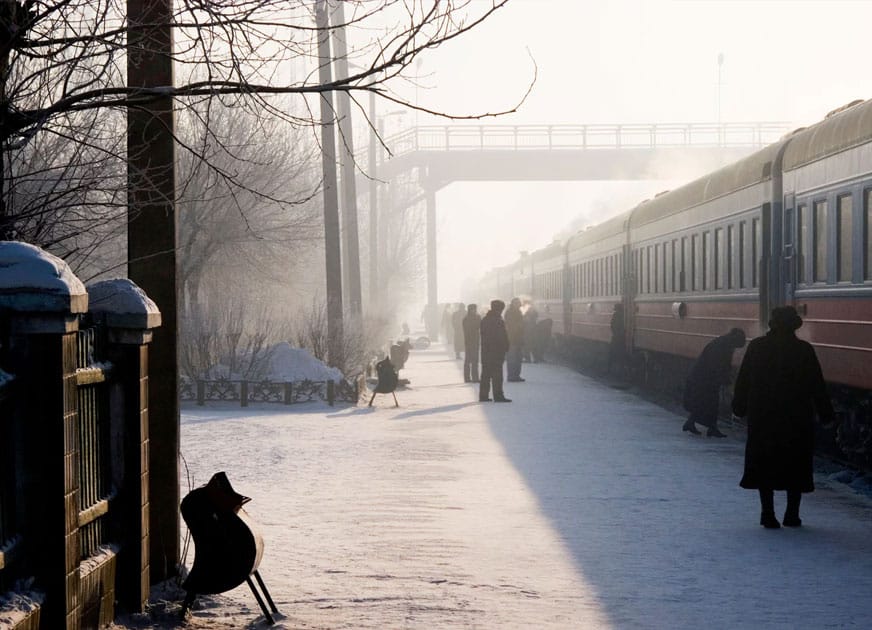
The world’s longest railway line was completed in 1916. Our writer embarks on the seven-day, 5,772-mile journey from Moscow to Vladivostok in the depths of winter when the snowy landscape is at its most beautiful.
Vladivostok railway station, far eastern Russia. The seven-day train journey from Moscow was over and we disembarked slowly into the black night, crunching through the snow and swaying slightly, as if we’d spent too long at sea.
To Russians, the Trans-Siberian Railway, stretching 5,772 miles from Moscow to Vladivostok (it takes more than nine hours to fly), is merely a commuter train. Businessmen, students and legions of soldiers use it, boarding and disembarking at remote stations to go home, visit family and reach army bases.
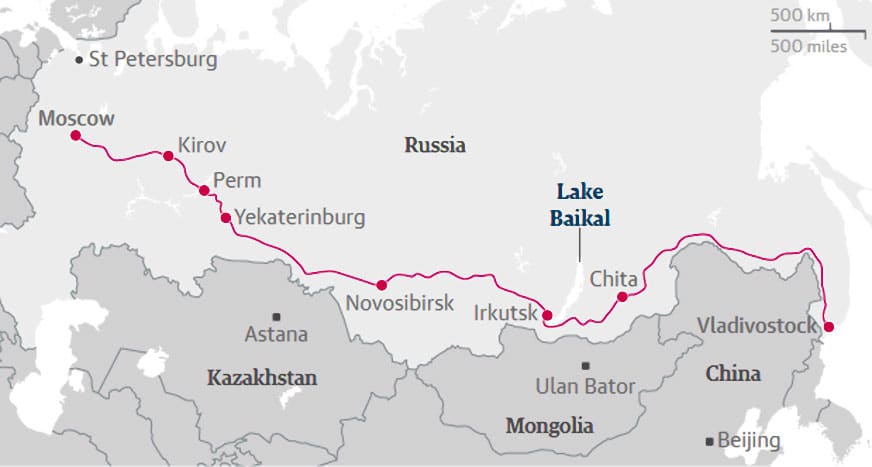
For many foreigners, though, it’s the epitome of romantic train journeys – the chance to travel across the largest country on Earth on an absorbing, perception-shifting adventure, one that shakes up preconceived ideas about Russia and offers an insight into the Russian psyche. Like in Colin Thubron’s travel book, you are Among the Russians, especially in winter when few tourists use it.
This year marks the centenary of the Trans-Siberian Railway as we know it today. In 1916 as the first world war and civil war raged across Russia – causing the destruction of 60% of the country’s railway network – the Trans-Siberian was completed. Before then, the eastern end of the journey involved cutting across China, into what is now the Trans-Manchurian route. Nowadays, twice a week, the Rossiya (Russia) departs Moscow’s Yaroslavsky station, and it was from here that my Russian-speaking husband and I set off. Amid soldiers dressed in blue berets and camouflage fatigues, and worn-out looking policemen in black fur hats, we found our train. It was February. Although a summer trip offers endless daylight, we chose winter, when Siberia is at its most beautiful, snowy and photogenic.
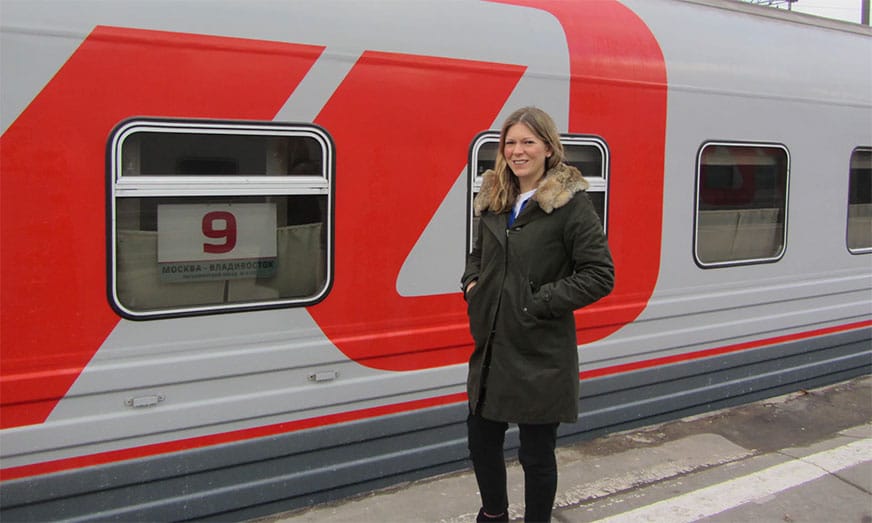
We made our way to our second-class, four-berth compartment. Neat and narrow, it came complete with TV and a full-length mirror on the back of a sliding door. Keen for the chance to talk to locals, we’d opted for this over the antisocial first-class, two-berth compartments and the noisy, crowded open-plan bunks. Under the two fold-down bottom bunks, heaters belched out hot air. For the next three hours we had the cabin to ourselves; after that it would be a shared experience the whole way.
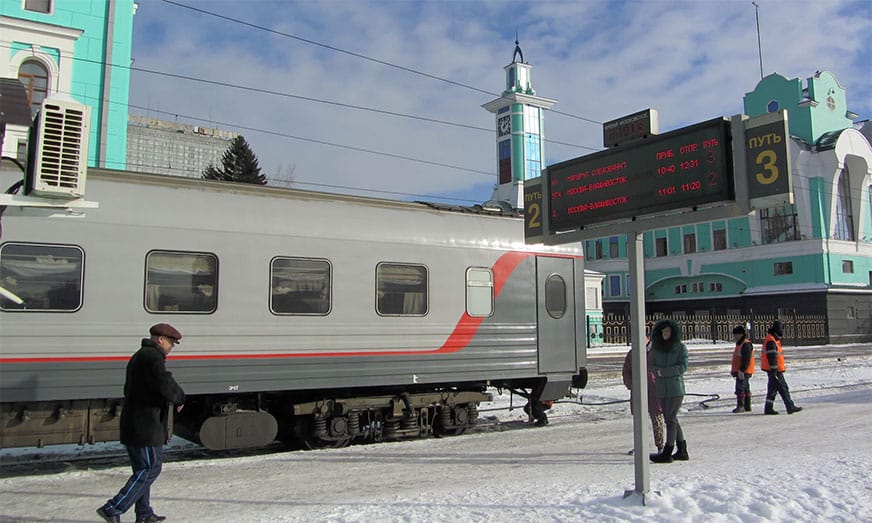
It is three nights to Irkutsk in Siberia, where, like most Trans-Sibbers, we’d break the trip for two nights before travelling for another three days to reach Vladivostok (literally “to rule the east”) on the Pacific edge of Asia. We’d rarely move faster than 43 mph.
We eased out of a gloomy Moscow. The harsh economic chill mixed with a mild winter had created a subdued atmosphere and slush-lined streets.
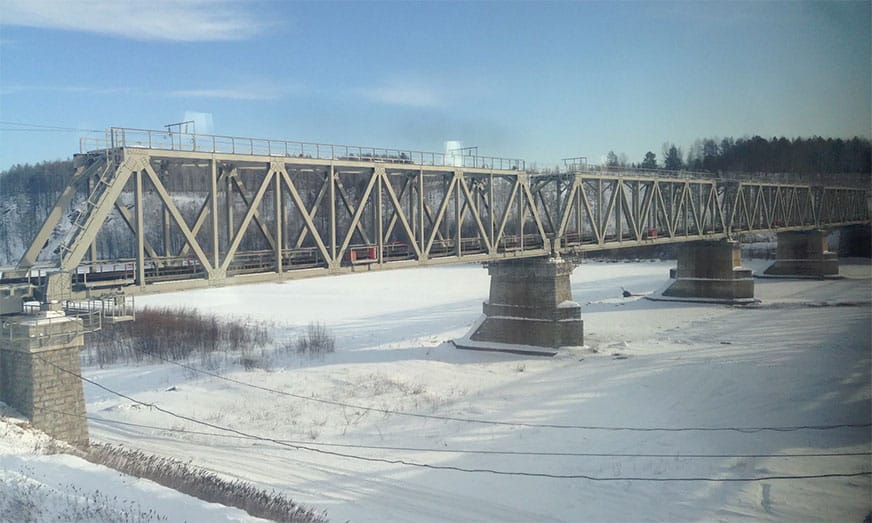
It sounds simple, and it is, but to understand the Trans-Siberian journey, you need to look out of the window. First, there are the station stops. Some have fantastically long tongue-twister names, such as Uyarspasopreobrazhenskoye. Hard-to-spot kilometre posts edge the railway line, marking the distance covered. The countryside changes but retains a comforting familiarity, a snowy bucolic theme. Outside Moscow I scrutinised the picket-fenced dachas (summer houses) painted in pastel colours. Later on in the journey, I watched out for differences in the izbi (Siberian huts) with their painted shutters and log piles.
Somewhere towards Kirov, an industrial city half a day out of Moscow, the journey found its rhythm. Our matronly provodnitsa (conductress) made regular appearances, checking tickets, selling pirozhki (stuffed buns) and handing out clean bedding. Passengers, in their standard issue grey and red Russian Railways sandals, flip-flopped back and forth to the samovar for hot water to make tea. Outside, a bleached-out white sun shone, torch-like, illuminating huge housing blocks that encircle industrial towns like mandalas.
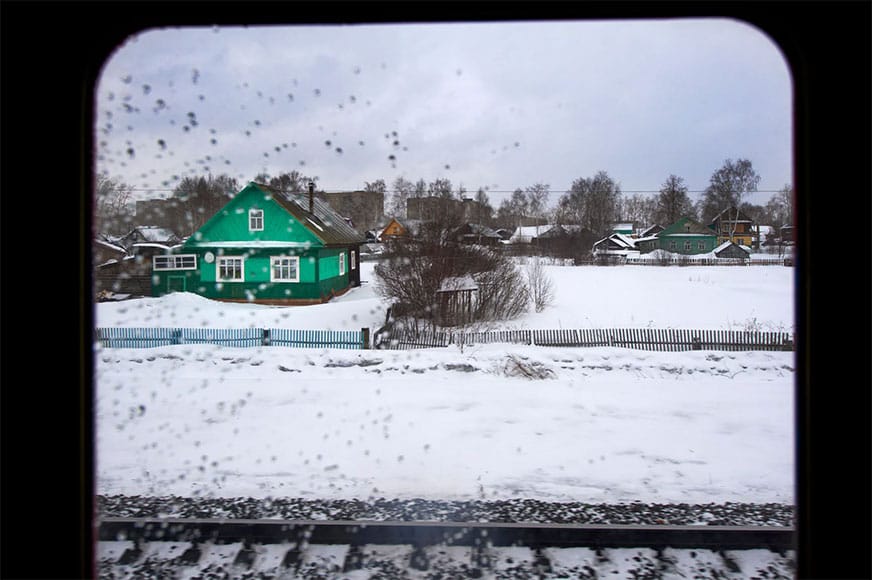
Good intentions to tackle Tolstoy were, I decided, laughable on this train. The landscape is too engrossing, too hypnotic. Our travel-tired eyes succumbed to the scenery until darkness fell. Come morning, the snowy motion picture of birch trees, banks of snow and taiga would repeat, as if on a loop, and once again our attention would be held hostage.
At Vladimir (119 miles), Michael, a businessman, and Yevgeny a bandy (similar to ice-hockey) referee, joined us, and shook our hands in the formal Russian way. Michael, Slavic-looking with high cheekbones and Putin-esque eyes, told us that he wasn’t a fan of train travel. “No fresh air but a lot of fresh smells,” he said dryly.
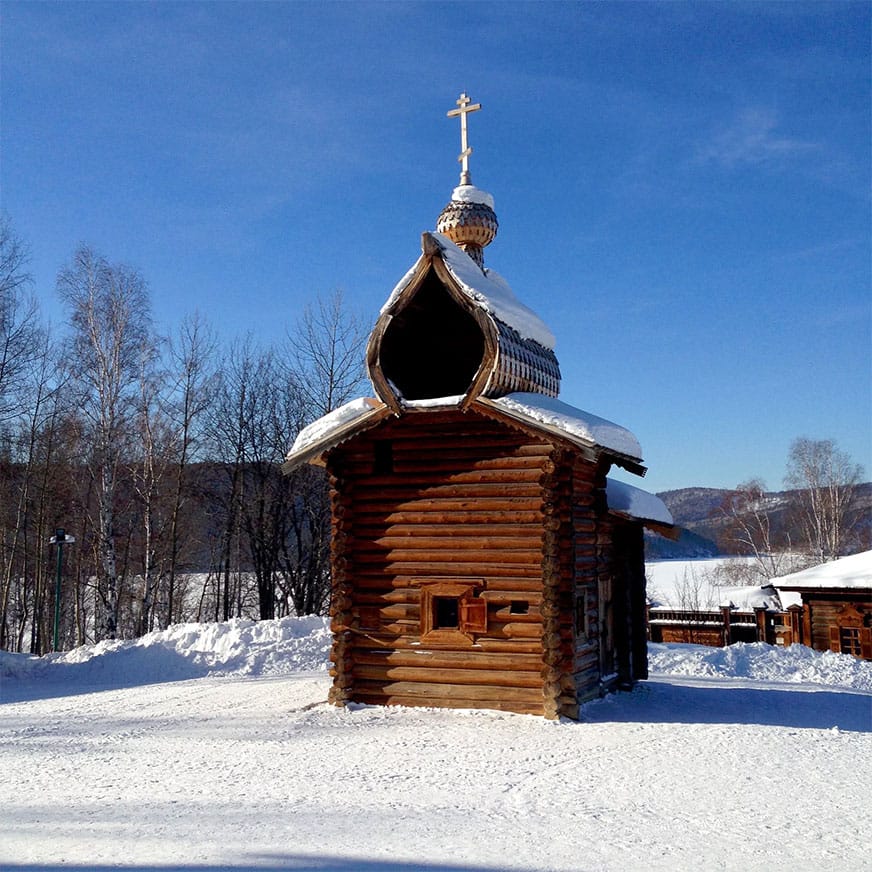
When we woke at Perm (892 miles), Vladimir, a bathroom salesman who spoke some English, had taken Michael’s place. Yevgeny had left. It was piercingly cold outside, minus 20C or so. Children in metallic puffa jackets hauled skis past spindly birch trees, dogs with bushy tails scavenged in frozen bins and the snow on the rooftops was so thick that the wooden houses looked fit to collapse. Every river we crossed was frozen solid. Watery sunlight melted the patchy ice that had collected on the inside of the train window overnight, creating rivulets of condensation.
We went in search of food, darting through the freezing gaps that connect the carriages. The smell of fried potatoes and solyanka (a greasy thick soup with salty cured meats, sausages, olives, dill and sour cream) led us to the small dining car with its cherry-red faux leather seats, frilly yellow curtains and rattling light fittings. It was empty. “Russians prefer to picnic in their cabins,” the provodnitsa told us glumly.
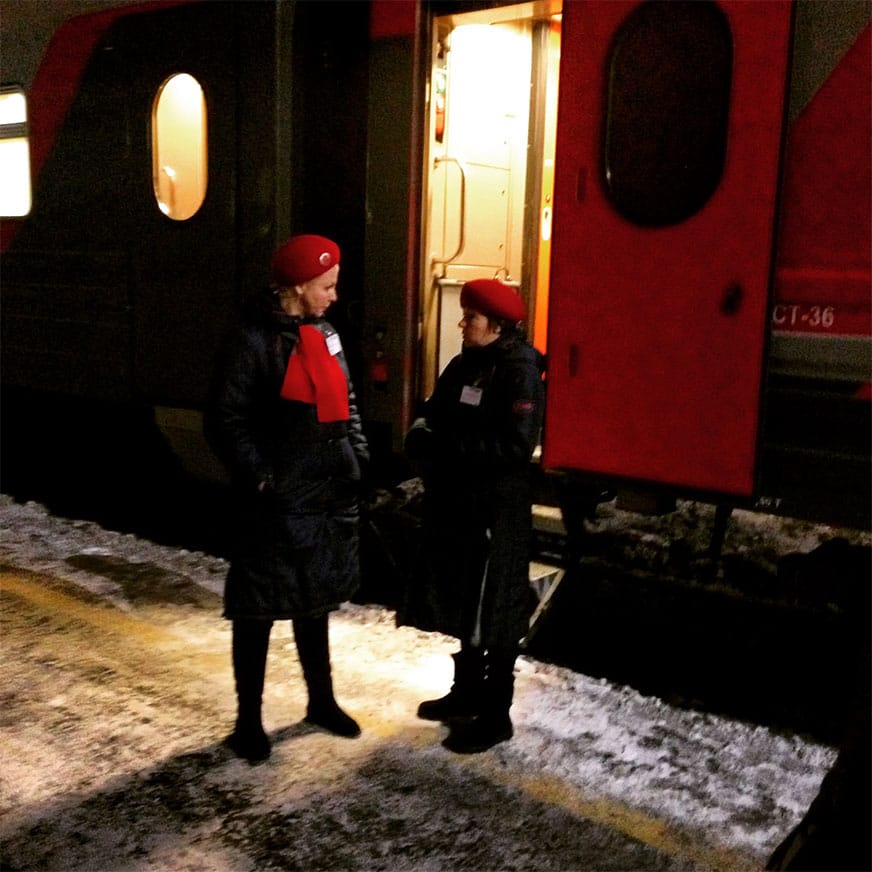
I ordered tea and a £2 bowl of kasha (porridge), which came topped with a slick of butter. The chef appeared momentarily, dressed in slippers and a velour leopard-print tracksuit, her tangerine hair curled around pink rollers. She gave us a wink then quickly disappeared.
We gazed out of the grimy window. Near the town of Kungar (953 miles), men bulbous in winter clothes were ice-fishing in the middle of the Sylva river. Persil-white snow covered timber mills and gingerbread houses rushed past. Days became distorted as we sped through time zones – that the train runs on Moscow time the whole way adds to the confusion (it would be Moscow +7 by the end of the journey).
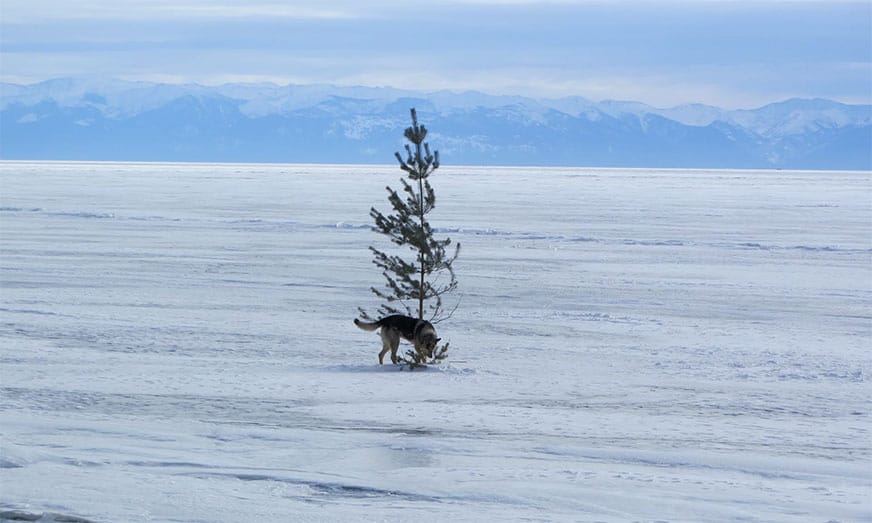
Just before we hit Siberia proper, at 1,306 miles, Tatiana and Alexi boarded at Yekaterinburg, with a picnic bag the size of a washing machine. Inside was rye bread, a brick-sized hunk of white pork fat, several litres of vodka and a crate of beer. Alexi was 32, a staff sergeant in the army, and looked like a young Tony Soprano in his wolf fur-lined leather jacket. A crucifix swung around his grey vest and an ornate army sentry ring glittered on his left hand. His round-faced wife was rosy-cheeked and cheerful. Neither of them had ever left Siberia they told us.
Shots were toasted one after the other and were chased with greasy chunks of the smoky, home-cured pork back fat. It cut the vodka beautifully. At 6am, three bottles of vodka later, the cabin was swimming. Lulled by the cradle-rock of the train, we collectively dozed off. When we woke at lunchtime, the tangy air smelled of warm feet, booze and armpits. There are no showers on board and fresh sheets are given out just once, upon boarding.
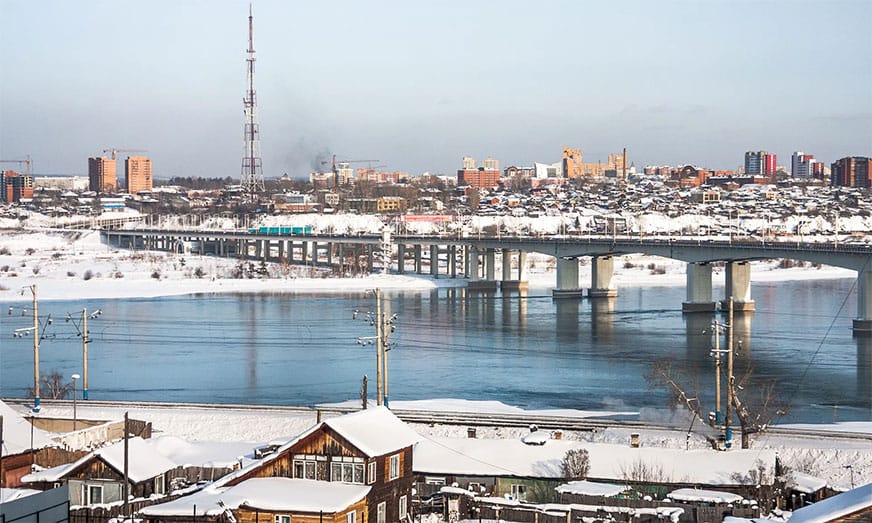
At 3,069 miles, where there was little more to see than vast expanses of taiga, even the stations had wintry names. We pull into Zima (“winter” in Russian), then Kuytun (“cold” in the language of the local Mongol Buryat people). Outside it was almost minus 30C. Finally, we reached snow-clad Irkutsk (3,222 miles), capital of Eastern Siberia.
It is a handsome city of wooden 19th-century houses and good restaurants. Relieved to have proper food, we snatched at garlic bread and devoured piles of hot pasta and risotto at Figaro. On Karl Marx Street men shovelled the snow from rooftops onto the pavements below to stop their houses collapsing under the weight. Huge dagger-like icicles hung dangerously from window ledges.
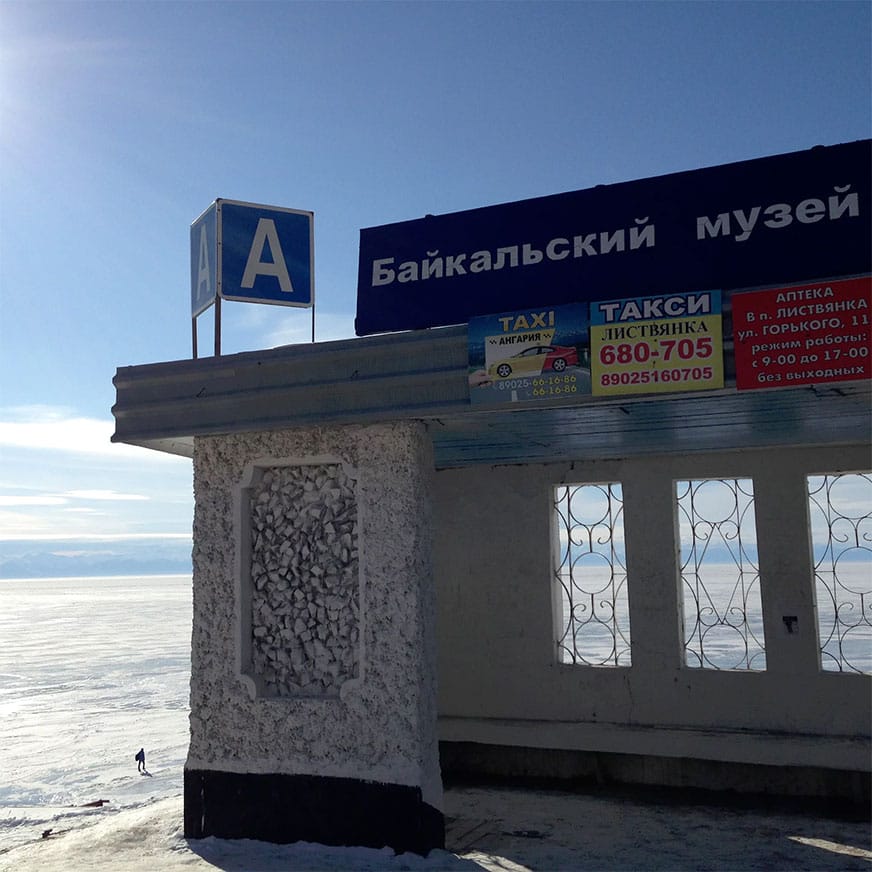
The following day, we drove for 45 miles out of Irkutsk to Lake Baikal, the world’s deepest lake. We walked gingerly on the three-metre thick ice, passing wolf-like pet dogs out for their daily exercise. In the distance, cars drove across it, despite warnings of hot springs and perilous melted patches. We feasted on omul, the local oily fish, which is smoked and sold in supermarkets and restaurants.
The next evening, at 21.22, we returned to the train, pleased to be back on board, despite the poor food and lack of sleep. Stockholm syndrome, we joked. The warm train was softly scented by omul – most passengers boarded with bags of it. In our cabin, the TV blared out the 1970s Soviet comic science fiction film Ivan Vasilievich Changes Profession. We shook hands with Andrei, a 22-year-old soldier, and Dmitri, our new cabin-mates, already settled into the top bunks. At Ulan-Ude, at 4am, Pavel, a navy officer, boarded and quietly replaced Dmitri.
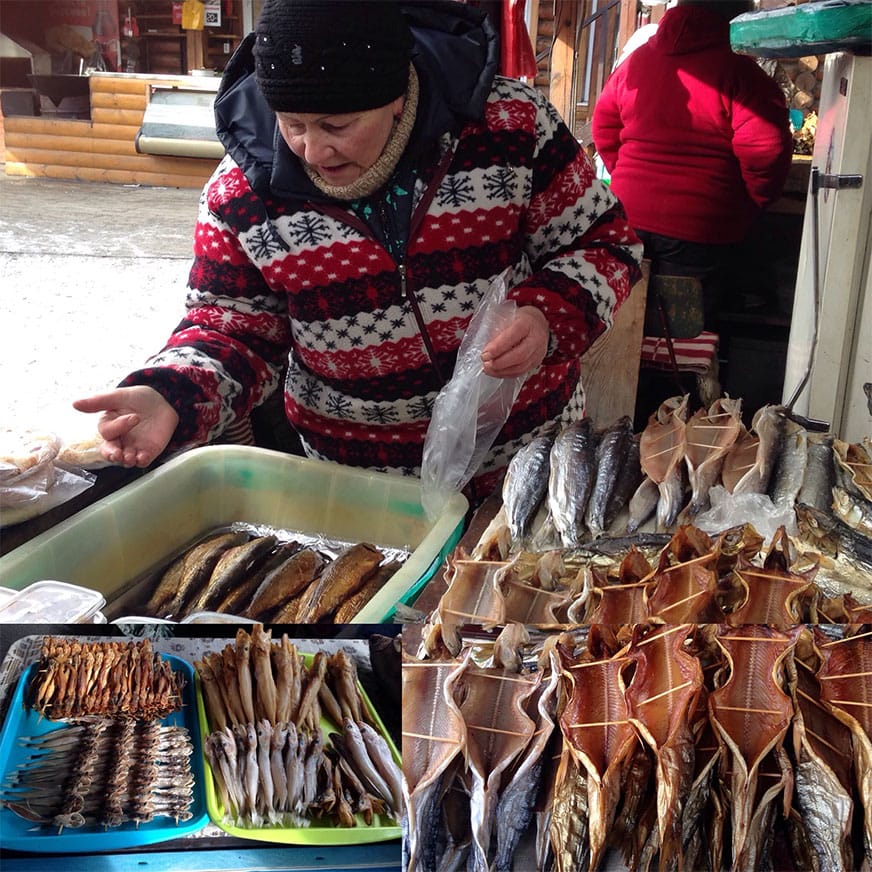
From the dining car at breakfast, we watched the wind-swept tundra, its long grass bent double by the wind. Thin and delicate clouds hovered above Lesnoy, a small station just before Chita (3,852 miles) and we continued past Takhtamygda, a grim valley with a grimmer prison, lined with inward-facing watchtowers and barbed wire. For the next two days the scenery changed little: taiga and permafrost met swampy lowlands for hundreds of miles.
Every afternoon at 4pm we’d return to the dining car and drink Baltika beer and chat with Olga, the lonely provodnitsa, who told us on arrival at Vladivostok she would “return straight away to Moscow”.
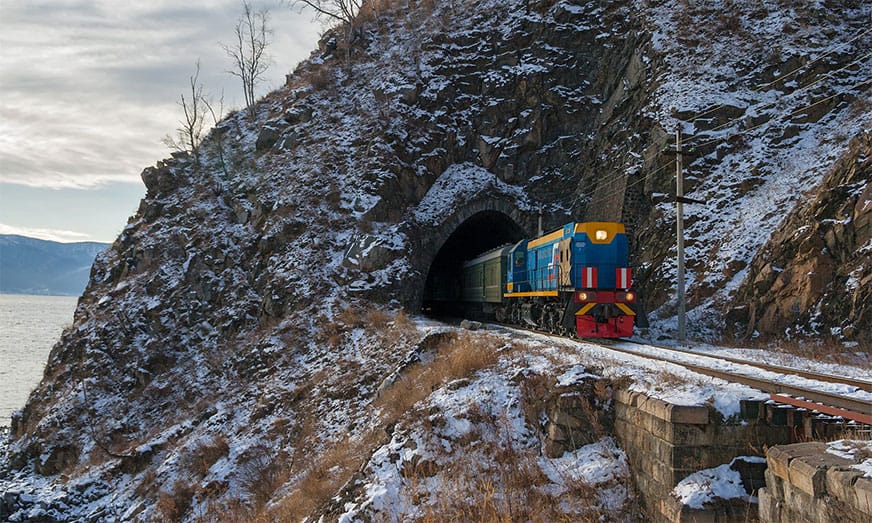
Another seven days on the Rossiya – cooking, cleaning and looking after her passengers. Another seven days crossing wild landscapes, ferrying an ever-changing cast of characters on an epic 5,772-mile journey across Russia.
The trip was provided by Regent Holidays (020-7666 1244), which has a 12-day Moscow to Vladivostok Trans-Siberian Railway trip from £1,365pp, based on two sharing three-star hotel rooms in Moscow, Irkutsk and Vladivostok (B&B) and sharing a second-class, four-berth compartment on the train. Flights and meals on the train extra
Comments
Add comment